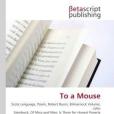《to a mouse》是Robert burns所作的一首詩,創作於1785年。
基本介紹
- 中文名:寫給小鼠(致小鼠)
- 外文名:To a Mouse
- 作者:Robert burns
- 寫作時間:1785年
- 簡述:人與農場老鼠的關係
- 文體:詩
簡介,原文,作品影響,
簡介
"To a Mouse"是Robert Burns 在1785年寫的一首詩。詩歌大致描述了沒有農場之前,人和鼠的關係是非常融洽的,可是農場一旦建立,平衡就會被打破,老鼠勢必會被追殺。
原文
ON TURNING HER UP IN HER NEST WITH THE PLOUGH, NOVEMBER, 1785.
[This beautiful poem was imagined while the poet was holding the plough, on the farm of Mossgiel: the field is still pointed out: and a man called Blane is still living, who says he was gaudsman to the bard at the time, and chased the mouse with the plough-pettle, for which he was rebuked by his young master, who inquired what harm the poor mouse had done him. In the night that followed, Burns awoke his gaudsman, who was in the same bed with him, recited the poem as it now stands, and said, "What think you of our mouse now?"]
1
Wee, sleekit, cow'rin', tim'rous beastie,
O, what a panic's in thy breastie!
Thou need na start awa sae hasty,
Wi' bickering brattle!
I wad be laith to rin an' chase thee,
Wi' murd'ring pattle!
2
I'm truly sorry man's dominion
Has broken nature's social union,
An' justifies that ill opinion,
Which makes thee startle
At me, thy poor earth-born companion,
An' fellow-mortal!
3
I doubt na, whyles, but thou may thieve;
What then? poor beastie, thou maun live!
A daimen icker in a thrave
'S a sma' request:
I'll get a blessin' wi' the lave,
And never miss't!
4
Thy wee bit housie, too, in ruin;
Its silly wa's the win's are strewin'!
An' naething, now, to big a new ane,
O' foggage green!
An' bleak December's winds ensuin',
Baith snell and keen!
5
Thou saw the fields laid bare an' waste,
An' weary winter comin' fast,
An' cozie here, beneath the blast,
Thou thought to dwell,
'Till, crash! the cruel coulter past
Out thro' thy cell.
6
That wee bit heap o' leaves an' stibble,
Has cost thee mony a weary nibble!
Now thou's turn'd out, for a' thy trouble,
But house or hald,
To thole the winter's sleety dribble,
An' cranreuch cauld!
7
But, Mousie, thou art no thy lane,
In proving foresight may be vain:
The best laid schemes o' mice an' men,
Gang aft a-gley,
An' lea'e us nought but grief and pain,
For promis'd joy.
8
Still thou art blest, compar'd wi' me!
The present only toucheth thee:
But, Och! I backward cast my e'e,
On prospects drear!
An' forward, tho' I canna see,
I guess an' fear.
標準英文
1
Small, crafty, cowering, timorous little beast,
O, what a panic is in your little breast!
You need not start away so hasty
With argumentative chatter!
I would be loath to run and chase you,
With murdering plough-staff.
2
I'm truly sorry man's dominion
Has broken Nature's social union,
And justifies that ill opinion
Which makes you startle
At me, your poor, earth born companion
And fellow mortal!
3
I doubt not, sometimes, but you may steal;
What then? Poor little beast, you must live!
An odd ear in twenty-four sheaves
Is a small request;
I will get a blessing with what is left,
And never miss it.
4
Your small house, too, in ruin!
Its feeble walls the winds are scattering!
And nothing now, to build a new one,
Of coarse grass green!
And bleak December's winds coming,
Both bitter and keen!
5
You saw the fields laid bare and wasted,
And weary winter coming fast,
And cozy here, beneath the blast,
You thought to dwell,
Till crash! the cruel plough passed
Out through your cell.
6
That small bit heap of leaves and stubble,
Has cost you many a weary nibble!
Now you are turned out, for all your trouble,
Without house or holding,
To endure the winter's sleety dribble,
And hoar-frost cold.
7
But little Mouse, you are not alone,
In proving foresight may be vain:
The best laid schemes of mice and men
Go often awry,
And leave us nothing but grief and pain,
For promised joy!
8
Still you are blest, compared with me!
The present only touches you:
But oh! I backward cast my eye,
On prospects dreary!
And forward, though I cannot see,
I guess and fear!
作品影響
John Steinbeck後用這首詩中的一句話 "The best laid schemes o' mice an' men / Gang aft agley"作為他1937年的小說"Of mice and men"的題目,並且憑藉此書獲得了諾貝爾文學獎

